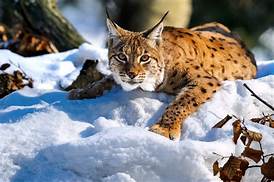Can You Keep a Lynx as a Pet?
Keeping a lynx as a pet may seem like a fascinating idea, but it's crucial to understand the complexities and challenges associated with owning such an animal. Lynxes are wild predators with specific needs that cannot be fully met in a domestic setting.

Habitat and Enclosure
Lynxes require a spacious and secure enclosure that replicates their natural habitat. They need access to trees for climbing, perches for observation, and a large outdoor area for exercise and hunting stimulation. Creating an adequate enclosure that meets their needs can be expensive and time-consuming.
Diet and Nutrition
Lynxes are obligate carnivores, meaning they must consume meat to survive. Providing them with a balanced diet that meets their nutritional requirements is challenging. You must offer a variety of fresh, high-quality meats and ensure they receive the correct portions to prevent obesity or health issues.
Exercise and Enrichment
Lynxes are highly active animals that require daily exercise and mental stimulation to remain healthy and happy. They need opportunities to run, climb, and stalk prey. Providing adequate exercise and enrichment can be difficult in a domestic setting.
Safety and Public Perception
Keeping a lynx as a pet can raise safety concerns. Lynxes are wild animals and have the potential to cause harm to humans and other animals. They have sharp claws and teeth and may become aggressive if they feel threatened. Additionally, many communities have regulations prohibiting the ownership of wild animals or restricting their possession to facilities with specialized permits.
Legal and Ethical Considerations
In many jurisdictions, keeping a lynx as a pet is illegal. Even where it is permitted, obtaining the necessary permits and meeting the legal requirements can be complex and costly. It is essential to research local laws, regulations, and ethical considerations before acquiring a lynx.
Conclusion
While owning a lynx as a pet may seem alluring, it is crucial to prioritize the animal's well-being and safety. Keeping a lynx in captivity poses numerous challenges, and the potential risks far outweigh the benefits. It is best to appreciate these fascinating creatures in their natural habitats rather than attempting to keep them as pets.
Declaration: All article resources on this website, unless otherwise specified or labeled, are collected from online resources. If the content on this website infringes on the legitimate rights and interests of the original author, you can contact this website to delete it.




